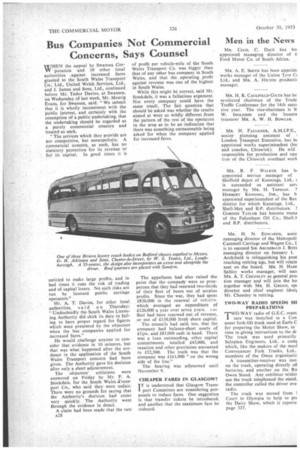Bus Companies Not Commercial Concerns, Says Counsel
Page 30

If you've noticed an error in this article please click here to report it so we can fix it.
WAIEN the appeal by Swansea CorVV poration and 10 other local authorities .against increased fares granted to the South Wales Transport Co., Ltd., United Welsh Services, Ltd., and J. James and Sons, Ltd., continued before Mr. Tudor Davies, at Swansea, 'on Wednesday of last week, Mr. Meurig Evans, for Swansea, said: "We submit that it is wholly inconsistent with the Public interest, and certainly with the conception of a public undertaking, that the undertaking should be regarded as a purely commercial concern and treated as such.
:" The services which they provide are not competitive, but monopolistic. A commercial concern, as such, has no statutory protection for its revenue or for its capital. In good times it is entitled to make large profits, and in bad times it runs the risk of trading and of capital losses. No such risks are run by licensed public carriage operators." Mr. A. T. Davies, for other local authorities, said on Thursday; "Undoubtedly the South Wales Licensing Authority did shirk its duty in failing to have proper regard for figures which were presented by the objectors when the bus companies applied for increased fares."
He would challenge anyone to consider that evidence in 10 minutes, but that was what happened after the evidence in the application of the South Wales Transport concern had been given. The Authority gave his decision after only a short adjournment. The objectors' criticisms were answered on Friday by Mr. F. A. Stockdale, for the South Wales Zransport Co., who said they were unfair. There were no grounds for saying that the Authority's decision had come very quickly. The Authority went through the evidence in detail.
A claim had been made that the rate of profit per vehicle-mile of the South Wales Transport Co. was bigger than that of any other bus company in South Wales, and that the _operating profit against revenue was one of the highest in South Wales.
While this might be correct, said Mr. Stockdale, it was a fallacious argument. Not every company could have the same result. The fair question that should be asked was whether the results aimed at were so wildly different from the pattern of the rest of the operators in the area as to be an .indication that there was something unreasonable being asked for when the company applied for increased fares.
The appellants had also raised the point that the company were so prosperous that they had renewed two-thirds of their fleet of buses out of surplus profits. Since the war, they had spent £830,000 in the renewal of veh'c!n. which averaged an expenditure of £120,000 a year over seven years. rite fleet had been renewed out of revenue, or out of £150,000 fresh share capital.
The councils had said, too, that the company had balance-sheet assets of film. and £83,000 cash in hand. There was a loan outstanding, other capital commitments totalled £43,000, and taxation and other provisions amounted to £52,500. The truth was that the company was £161,000 "on the wrong side of the line."
The hearing was adjourned until November 9.




















































































